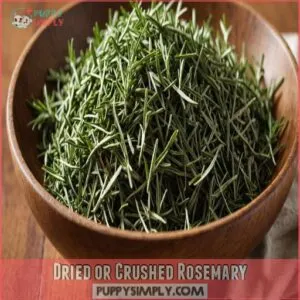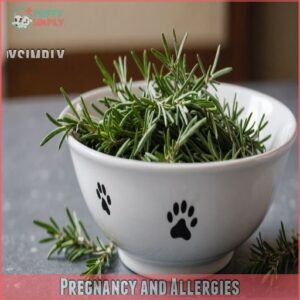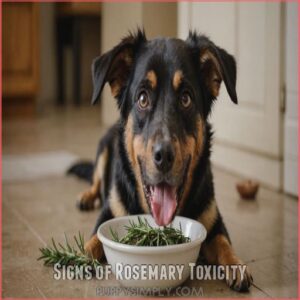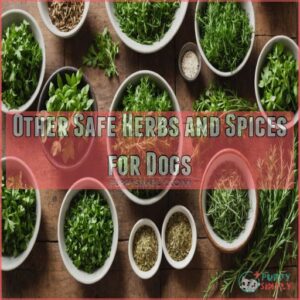This site is supported by our readers. We may earn a commission, at no cost to you, if you purchase through links.
 Can dogs eat rosemary? Yes, but moderation is key! A tiny sprinkle of fresh or dried rosemary on your pup’s food is generally safe. It’s packed with antioxidants, potentially boosting their health. Think of it as a tasty, natural supplement, not a main course.
Can dogs eat rosemary? Yes, but moderation is key! A tiny sprinkle of fresh or dried rosemary on your pup’s food is generally safe. It’s packed with antioxidants, potentially boosting their health. Think of it as a tasty, natural supplement, not a main course.
However, too much rosemary can upset their tummy, so start small—a teaspoon at most. Remember, every dog is different, so watch for any unusual reactions. Want to know more about the amazing benefits—and potential pitfalls—of this aromatic herb for your furry friend? We have all the information you need!
Table Of Contents
- Key Takeaways
- What is Rosemary for Dogs
- Benefits of Rosemary for Dogs
- Preparing and Giving Rosemary to Dogs
- Risks and Precautions With Rosemary
- Other Safe Herbs and Spices for Dogs
- Monitoring and Safety Measures
- Frequently Asked Questions (FAQs)
- Can a dog eat too much Rosemary?
- Can essential rosemary oil be consumed?
- Is Rosemary good for dogs?
- Can dogs eat rosemary tea?
- Can pregnant dogs eat Rosemary?
- What can I give my Dog if he eats Rosemary?
- What happens if my dog eats rosemary?
- Is rosemary toxic to dogs or cats?
- Do dogs like the taste of rosemary?
- Can dogs eat rosemary and thyme?
- Can rosemary help with dog anxiety?
- Is dried rosemary safer than fresh?
- How often should rosemary be given?
- Does rosemary affect dog allergies?
- Can rosemary improve dog coat health?
- Conclusion
Key Takeaways
- Dogs can safely eat rosemary in moderation; some pet owners also explore the health benefits of adding cooked, plain mushrooms, like store-bought mushroom varieties, to their pup’s diet; it offers health benefits like antioxidants and can act as a natural flea repellent.
- Always start with a small amount, about a teaspoon, and monitor your dog for any unusual reactions or signs of discomfort.
- It’s crucial to consult your vet before introducing rosemary, especially if your dog is pregnant or taking medication.
- Avoid using essential rosemary oil for ingestion, as it can cause serious health issues; it’s meant for topical or aromatherapy use only.
What is Rosemary for Dogs
Rosemary for dogs is a safe, aromatic herb that’s packed with potential health benefits.
You’ll find this fragrant plant in some commercial dog foods, and it can be a flavorful addition to your pup’s diet when used in moderation.
Definition and Properties
You’ve probably spotted rosemary in your spice rack, but did you know it’s more than just a tasty herb?
This fragrant evergreen shrub, native to the Mediterranean, packs a punch with its needle-like leaves and woody stems.
Rosemary’s rich chemical composition includes rosmarinic acid and essential oils, giving it a complex flavor and potential health benefits.
It’s been used for centuries in cooking and traditional medicine, and now it’s catching the attention of pet owners too.
Safety and Toxicity
When giving rosemary to your dog, it’s important to consult the recommended rosemary dog dosage, as found on websites like rosemary dog dosage.
While rosemary isn’t toxic to dogs, it’s key to be cautious.
Stick to a small rosemary dosage for dogs, around a teaspoon a day.
Watch for symptoms of toxicity, such as vomiting or
Nutritional Value
Imagine exploring rosemary’s nutritional value for dogs.
This aromatic herb offers a variety of nutrients, and consuming small amounts can also provide antioxidant properties that boost heart health and immunity, as seen in rosemary for dogs benefits.
- Iron: Essential for healthy blood.
- Calcium: Essential for strong bones.
- Vitamin B6: Important for protein processing.
Benefits of Rosemary for Dogs
You’d be surprised to learn that rosemary can benefit your dog with its antioxidant properties, helping protect cells from damage.
It might also act as a natural flea repellent, sparing you both from the pesky critters that can cause endless scratching and biting.
Antioxidant Properties
Rosemary for dog health can pack a punch with its antioxidant properties.
This herb helps combat free radical damage, offering significant antioxidant benefits for aging dogs.
Consider adding it to your pup’s diet for immune support.
Many dog owners are turning to homemade dog treats made easy to ensure their pets are getting the nutrients they need. Mixing a sprinkle of rosemary into homemade dog treats could be a game changer, boosting both health and flavor effortlessly.
Anti-inflammatory Effects
Beyond its antioxidant power, rosemary boasts impressive anti-inflammatory properties beneficial for your canine companion.
Think of it as a natural remedy for aches and pains!
Rosemary can help with:
- Rosemary for Arthritis
- Rosemary and Joint Pain
- Canine Inflammatory Bowel Disease
These anti-inflammatory benefits make rosemary a valuable addition to your dog’s wellness routine, but always consult your vet before making significant dietary changes.
Remember moderation is key to avoid rosemary toxicity.
Antimicrobial Properties
Just as rosemary’s anti-inflammatory effects help soothe pain, its antimicrobial properties tackle bacteria that threaten your pup’s health.
This herb can be a trusty ally against skin infections, dental threats, and even pesky wound bacteria.
A pinch of rosemary in their diet could keep your furry friend wagging happily and less prone to digestive issues.
Remember moderation to avoid rosemary toxicity!
Mood and Brain Function
While considering rosemary’s antimicrobial perks, let’s talk about its roles in mood and brain function.
This aromatic herb might boost your pup’s mood and support brain health, alleviating dog anxiety and cognitive decline.
Research suggests that rosemary’s impact on human brain health can be significant, with products specifically designed for rosemary for brain health.
Rosemary
Natural Flea Repellent
After boosting your dog’s brainpower, harness rosemary’s power as a natural flea repellent.
You can make simple DIY recipes with rosemary essential oil for a safe and effective solution.
Use it cautiously, though, as some pups may have allergies or other safety concerns.
Additionally, talk to your vet to make sure your approach to using rosemary for dogs doesn’t compromise their health.
Preparing and Giving Rosemary to Dogs
You’re ready to explore rosemary for your canine companion, whether you choose fresh leaves, dried herbs, or extracts.
Add it sparingly to their meals or treats, keeping in mind that moderation is key to avoiding any potential tummy troubles.
Fresh Rosemary Leaves
Introduce a balanced homemade diet like the dalmatian homemade dog food guidelines, which include low-purine diet options, to your dog’s meal plan. Introduce fresh rosemary leaves to your dog’s diet by finely chopping and mixing them with their food.
Being mindful of any lingering pet odors that a best air freshener for dog smell can help eliminate.
Use a dog-safe dosage, never more than a teaspoon a day, to enjoy rosemary benefits without risking rosemary toxicity in dogs.
It’s like adding a dash of flair to
Dried or Crushed Rosemary
Dried rosemary, with its potent aroma and flavor, can boost your dog’s meals without overwhelming them.
Use it sparingly—just a pinch will suffice in recipes or sprinkled over food.
Store dried or crushed rosemary in an airtight container, away from light, to preserve its benefits.
Always monitor for any signs of rosemary toxicity in dogs, ensuring their safety.
Rosemary Extract
With rosemary extract, always prioritize safety.
Start with a tiny amount—a few drops—mixed into your dog’s food.
Monitor for any upset tummies.
Rosemary extract benefits are touted, but dosage is key.
Too much can cause problems.
Remember, a little goes a long way!
Always consult your vet before adding supplements to your pup’s diet, making sure safe herb use is followed.
This makes sure your furry friend enjoys the rosemary extract benefits without the risks.
Rosemary Oil
Imagine this: A nutritious addition to your pup’s diet, like fermented cabbage with probiotics for gut health benefits of sauerkraut, can have a significant impact on their overall well-being. Rosemary oil brings surprising benefits to your dog’s health, from acting as a natural flea repellent to soothing their skin.
But don’t go overboard—using it safely is essential.
Not all oils are created equal; rosemary oil dosage varies by size and sensitivity.
Always start small to avoid side effects like dog allergies or upset stomach.
Mixing With Food or Water
Ever wondered how to sprinkle some rosemary magic into your dog’s diet?
You can mix a pinch of rosemary into their kibble or dilute it in their water.
This adds a flavorful twist, enhancing rosemary benefits without overwhelming their senses.
Remember, moderation is key! A sprinkle here and there makes sure your furry friend enjoys rosemary-infused treats safely.
Homemade Dog Treats
Considering homemade dog food for your pet can be a great way to provide a balanced and nutritious diet, especially with the right Schnauzer dietary guidelines, considering adding rosemary to your dog’s meal plan?
Kick things up a notch with homemade dog treats.
Incorporate rosemary for an aromatic flavor boost that’ll make those tails wag.
Stick to a teaspoon of rosemary in your recipes to make sure dog treat safety.
Explore ingredient alternatives and baking tips for healthy treats.
Voilà, rosemary benefits in a tasty, homemade package!
Risks and Precautions With Rosemary
While rosemary can add a whimsical touch of flavor to your dog’s meals, it’s important to be mindful of potential risks like excessive consumption and interactions with medications.
Keeping an eye out for signs of rosemary toxicity, such as gastrointestinal upset, makes sure your furry friend stays healthy and happy.
Excessive Consumption
While mixing rosemary into your dog’s food or treats is a safe flavor boost, going overboard isn’t!
Too much rosemary can lead to gastrointestinal upset or worsen rosemary side effects in dogs.
Keep an eye out for rosemary toxicity, as signs of overdose can vary.
Here’s what to do:
- Monitor intake.
- Stick to safe dosage.
- Be attentive.
Rosemary Oil Toxicity
Too much rosemary isn’t great for your pup; rosemary oil takes that concern up a notch.
Dilution is the name of the game to avoid rosemary oil toxicity.
Stick to safe dosages, as high amounts can cause symptoms like vomiting or lethargy.
Consider alternatives or consult your vet for the right usage of rosemary essential oil for dogs.
Pregnancy and Allergies
With pregnant dogs or those prone to allergies, proceed with caution. Before introducing rosemary, consult your vet. Here’s why:
- Rosemary might trigger allergic reactions in sensitive pups.
- The effects of rosemary during pregnancy aren’t fully understood.
- Always start with tiny amounts to observe your dog’s response. A little goes a long way!
Interactions With Medications
It’s important to be mindful of interactions between rosemary and medications your dog might be taking.
Before making any decisions, you can check websites like rosemary dog meds for more information on products related to rosemary for dogs.
Rosemary can influence medication effects, acting like a mischievous sprite tinkering with your pup’s health.
Signs of Rosemary Toxicity
Spotting rosemary toxicity in dogs involves watching for signs like vomiting, drooling, or lethargy.
If your pooch is suddenly shaky or having seizures, it’s time to connect the dots.
Rosemary can be a surprising culprit, so exercise caution.
Monitor any herb you introduce, as dogs can react differently.
Call the vet if your furry friend shows troubling symptoms.
Other Safe Herbs and Spices for Dogs
In terms of spicing up your dog’s life, there are several safe herbs and spices you can explore.
From cinnamon to turmeric, these tasty additions can offer health benefits like antioxidant support and digestive relief.
While keeping meals interesting for your pup.
Cinnamon
After understanding rosemary’s ups and downs for dogs, let’s explore cinnamon.
This spice isn’t just for your French toast—used rightly, it offers real perks.
Cinnamon for dogs can boost health, aiding digestion and reducing inflammation, and when used in moderation with oatmeal, it is a safe and healthy treat.
Keep it simple for Fluffy though, as too much can
Basil
Basil for dogs is like a sprinkle of magic in their meals, offering delightful benefits.
Consider these basil perks:
- Anti-inflammatory Properties: Basil may help soothe minor inflammation.
- Antioxidant Boost: Its antioxidants can support overall health.
- Digestive Aid: Basil can ease occasional tummy troubles.
Always introduce new herbs gradually, ensuring basil safety, and monitor your pup’s reaction carefully.
Thyme
Thyme, ever reliable and aromatic, is another safe herb for dogs.
Rich in antioxidants, thyme benefits include aiding digestion and supporting overall health.
It mightn’t replace rosemary for dogs, but it offers a gentle alternative.
| Herb | Benefits |
|---|---|
| Thyme | Antioxidant, digestive aid |
| Rosemary | Brain function, flea repellent |
| Cinnamon | Anti-inflammatory, adds flavor |
| Basil | Antioxidant, immune boost |
| Turmeric | Anti-inflammatory, joint health |
Ginger
Considering adding ginger to your dog’s diet?
It’s known for its ginger benefits, particularly for easing nausea.
Ginger for dogs can be helpful, but moderation is key.
A tiny amount of fresh ginger, maybe a sliver, is a good starting point.
Always consult your vet before introducing new foods, especially if your pup has pre-existing conditions.
Remember, responsible pet parenting means careful monitoring!
Too much ginger could upset their tummy.
Turmeric
Discover a golden secret in your spice cabinet!
Turmeric isn’t just for curry—it helps with dog allergies and digestion, and eases arthritis pain.
Sprinkle a little in your pup’s treats, but mind the turmeric dosage for dogs.
It’s wise to check with your vet first.
Remember, balance is key, just like with rosemary’s benefits for dogs.
Monitoring and Safety Measures
When introducing rosemary to your dog’s diet, it’s also a good idea to consider other nutrient-rich foods like anchovies, which provide essential omega-3 fatty acids, and consult your veterinarian, and start with small amounts to avoid any unexpected reactions.
Keep an eye out for adverse effects like tummy troubles and make sure to store rosemary essential oils safely out of reach of curious paws.
Consulting a Veterinarian
Your dog’s health is precious, so consulting a veterinarian about rosemary for dogs is wise. They can advise on rosemary dosage, safety concerns, and alternative herbs that won’t clash with any medication interactions.
- Rule out herbs toxic to dogs.
- Discuss rosemary for skin conditions.
- Confirm safe herbs for dogs.
- Adjust rosemary dosage for dogs.
- Navigate rosemary risks smoothly.
Starting With Small Amounts
After chatting with your vet, you’re ready to give rosemary a whirl.
Start with a tiny pinch mixed into your pup’s food—just enough for a sniff of flavor.
This gradual introduction helps you monitor your dog’s initial tolerance to this aromatic herb.
Remember, rosemary dosage for dogs is key; it helps avoid any potential rosemary risks while enjoying its benefits.
Monitoring for Adverse Effects
Keeping a watchful eye on your pup after introducing rosemary is key—observe for signs of trouble like lethargy, vomiting, or allergic reactions.
Each dog’s individual tolerance varies, so dosage guidelines really help.
If your furry friend shows any unusual symptoms, it might be rosemary toxicity, so consulting your vet makes sure you’re taking the best care of your pet’s health.
Keeping Rosemary Essential Oils Out of Reach
Watching your furry friend for adverse responses to rosemary is as important as ensuring rosemary essential oils stay out of paws’ reach.
These oils can cause problems if ingested, so store them wisely.
Try these tips:
- Secure bottles with childproof caps.
- Keep oils in high cabinets.
- Use pet-safe diffusers.
- Educate family on oil dangers.
Frequently Asked Questions (FAQs)
Can a dog eat too much Rosemary?
Did you know rosemary is safe in moderation, but too much can upset a dog’s stomach?
It might even drop blood pressure or bring on seizures.
So, keep rosemary treats small, and you’ll avoid any doggy dramas!
Can essential rosemary oil be consumed?
You shouldn’t consume essential rosemary oil directly.
It’s meant for aromatherapy or topical use.
Ingesting it can cause serious health issues, like gastric upset or seizures.
Always consult with a healthcare professional before considering consumption.
Is Rosemary good for dogs?
Picture a curious puppy nibbling rosemary sprigs—don’t worry! It’s safe for most dogs in small doses.
This fragrant herb might even boost their antioxidants and deter pests, but excessive intake can upset their tummy.
Always introduce gradually.
Can dogs eat rosemary tea?
Dogs can sip rosemary tea in small amounts.
It’s safe when the tea is weak and unsweetened, but make sure you consult your vet, as excessive consumption might unsettle their stomach.
Always introduce it gradually for safety.
Can pregnant dogs eat Rosemary?
While Rosemary isn’t toxic to pregnant dogs in small amounts, consult your vet before adding it to their diet.
Excessive use could cause digestive issues.
Always tread carefully with any new ingredient during this delicate phase.
What can I give my Dog if he eats Rosemary?
If your dog ate rosemary, don’t panic!
Small amounts are generally safe.
However, watch for vomiting or diarrhea.
If you see these symptoms, or he ate a large amount, call your vet immediately.
They can provide the best advice for your pup.
What happens if my dog eats rosemary?
Imagine rosemary as a gentle breeze whispering health secrets; it’s mostly safe for dogs in small amounts.
Overindulgence, however, can stir stomach woes like nausea.
Keep an eye out for drooling or lethargy as warning signs.
Is rosemary toxic to dogs or cats?
Rosemary isn’t toxic to dogs or cats, so you can relax.
It’s safe in moderation, even used in some pet foods.
Just keep it simple, as too much could upset their stomachs.
Enjoy those herbal benefits carefully!
Do dogs like the taste of rosemary?
Ever wondered if dogs like the taste of rosemary?
While some dogs might enjoy its aroma, others may not.
Dogs, with their unique tastes, might find rosemary appealing or not—it really varies by individual pup.
Can dogs eat rosemary and thyme?
Dogs can safely nibble on rosemary and thyme.
Both herbs aren’t toxic in small quantities, adding a nice touch to dog food.
But, like most things, moderation‘s key to prevent any tummy troubles.
Can rosemary help with dog anxiety?
While rosemary isn’t a well-proven remedy for dog anxiety, its calming scent might offer subtle relaxation effects.
Always consult your vet before trying new herbs, as your pup’s safety and comfort should be top priorities.
Is dried rosemary safer than fresh?
Comparing apples to oranges, dried and fresh rosemary have similar safety profiles for dogs.
Fresh rosemary contains more oils, which could irritate in high doses.
In moderation, dried rosemary is just as safe but lacks intense aroma.
How often should rosemary be given?
Don’t overdo it! A teaspoon daily is plenty.
Introduce it gradually to your pup’s food or water.
Watch for tummy troubles; if they appear, cut back or stop.
Always check with your vet first.
Does rosemary affect dog allergies?
Rosemary mightn’t directly trigger dog allergies but always keep an eye on signs of irritation or allergies.
Introduce it slowly and check for reactions like itching, digestive upset, or redness.
Consult your vet if concerns arise.
Can rosemary improve dog coat health?
Surprisingly, rosemary might boost your dog’s coat health.
Its antioxidants can potentially enhance shine and strength.
While studies in dogs are limited, small rosemary amounts in their diet could support overall skin and coat health.
Always consult your vet!
Conclusion
Regarding adding rosemary to your dog’s diet, a little goes a long way.
This aromatic herb offers surprising benefits, like antioxidant boosts and natural flea repellant properties; however, "too much of a good thing" can upset your pup’s tummy.
Always monitor how your dog reacts, start small, and consult your vet if you have concerns.
Keep rosemary in moderation, and you’ll add a healthy twist to your furry friend’s meals.





















